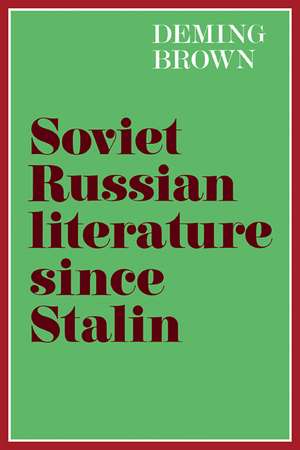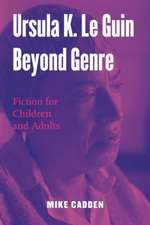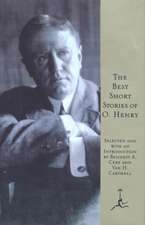Soviet Russian Literature since Stalin
Autor Deming Bronson Brownen Limba Engleză Paperback – 26 sep 1979
Preț: 325.01 lei
Nou
Puncte Express: 488
Preț estimativ în valută:
62.20€ • 67.54$ • 52.25£
62.20€ • 67.54$ • 52.25£
Carte tipărită la comandă
Livrare economică 22 aprilie-06 mai
Preluare comenzi: 021 569.72.76
Specificații
ISBN-13: 9780521296496
ISBN-10: 0521296498
Pagini: 404
Dimensiuni: 152 x 229 x 23 mm
Greutate: 0.59 kg
Ediția:Revised
Editura: Cambridge University Press
Colecția Cambridge University Press
Locul publicării:Cambridge, United Kingdom
ISBN-10: 0521296498
Pagini: 404
Dimensiuni: 152 x 229 x 23 mm
Greutate: 0.59 kg
Ediția:Revised
Editura: Cambridge University Press
Colecția Cambridge University Press
Locul publicării:Cambridge, United Kingdom
Cuprins
Acknowledgements; 1. The literary situation; 2. The oldest poets; 3. The first Soviet generation of poets; 4. Poets formed during the war; 5. The younger generation of poets; 6. The rise of short fiction; 7. The youth movement in short fiction; 8. The village writers; 9. Literature re-examines the past; 10. Literature copes with the present; 11. Aleksandr Solzhenitsyn; 12. The art of Andrei Sinyavsky; 13. Underground literature; 14. Conclusion; Notes; Select Bibliography; Acknowledgements to publishers; Index.
Recenzii
'An excellent survey of Russian literature encompassing the post-Stalin thaw of the late fifties, renaissance of the sixties, and retrogression of the seventies … A much needed state-of-the-art report for Western readers.' Booklist
'This extensive study could be well used as a college textbook of contemporary Soviet literature.' Library Journal
'Until this fine study, there had been no single comprehensive examination of Russian literature since Stalin's death.' Choice
'This extensive study could be well used as a college textbook of contemporary Soviet literature.' Library Journal
'Until this fine study, there had been no single comprehensive examination of Russian literature since Stalin's death.' Choice
Descriere
This study describes and evaluates the main trends in Soviet Russian prose and poetry since the death of Stalin in the light of the cultural, ideological, social and political developments of the past quarter-century.


















